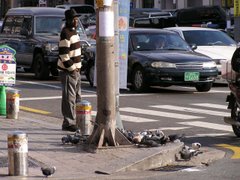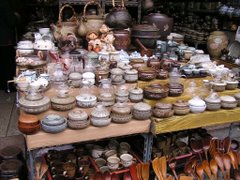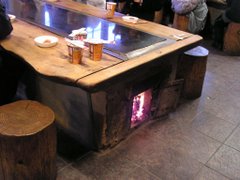Here are some "collaborative" exercises and activities that can be horizontally integrated between the technology class and the major subjects.
1. A class video. In a session, ask the students to write on a bond paper an adjective or phrase that would describe their town or their school or their country. The teacher can set up the digital video camera on a tripod. Then the students will show their papers one by one, including a short opinion of what they wrote.
2. Interview of a tourist. Pair students or form small groups. Ask them to find a tourist and get their opinion of the town and the impression about the people and their ways. Use a template of questions for uniformity. Then the students can ask if they can have a photo with the tourist using the phone camera. This is the proof they have conducted an interview. Instruct students to extend courtesy and thank the tourist as well.
3. Here's another example of a fun collaboration, the frozen mob. - http://www.youtube.com/watch?v=jwMj3PJDxuo The students can do a simulation of this activity in the plaza or townhall.
4. Storytelling in a blog or comics form. Form small groups. Each group can have a theme for their stories-- tragic, tales or legends, horror, mystery etc. Each one writes a story and the group decides to link each story. It can become a hyopernarrative, a series of stories with no beginning or end. It can be expressed in text or drawing form. Permit the students to create their stories using the local dialect.

Photo from some students doing an outreach teaching activity in a mission school.
5. A wiki portfolio of reflections. Upon reading a story or a novel, or upon watching a film, ask the students to create a wikipage and put their reflections. Here are some nice examples, reactions after an outbound trip.
a. http://isoyou.wikispaces.com/
b. http://siberiantigers.wikispaces.com/FIELD+TRIP+REFLECTION
It's kind of interesting to learn student reactions especially on collaborative activities. It's quite different from the individual work. Students become more conscious of the quality of their work, more interested to know the contribution of their classmate or teammate and the energy becomes very high among all the groups.










